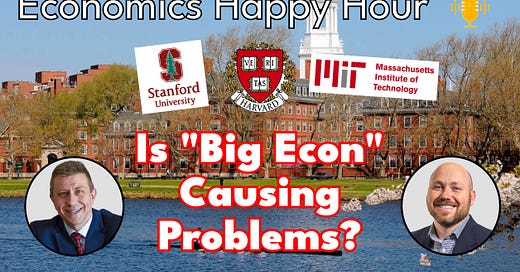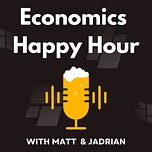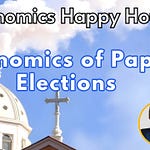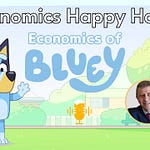Matt and Jadrian explore the power and influence of elite economics departments, discussing whether "Big Economics" programs have too much sway in the profession. Recent articles in the Financial Times and The Atlantic argue that a small group of top schools disproportionately shape the field, especially in terms of Nobel Prize distribution and academic publishing. Matt and Jadrian also discuss how faculty hiring and journal editing are dominated by the same few institutions, raising concerns about competition and diversity of thought within economics. Doesn’t economics teach that concentration can stifle innovation?
In this episode, we discuss:
Whether elite economics programs dominate the field too much.
The concentration of Nobel Prize winners at just a few top schools.
How journal publishing is influenced by elite institutions.
Whether this power dynamic stifles innovation in economic research.
Possible solutions to reduce the dominance of top universities in the profession.
And a whole lot more!
Catch up on some old episodes:
You can also listen to us on Google Podcasts, TuneIn Radio, and Apple Podcasts. If one of these is your go-to podcast service, be sure to rate us and subscribe!
Watch this episode on YouTube:
Some show notes:
We kicked off the episode chatting about the start of the semester and the challenges of balancing academic roles with administrative tasks before moving on to the all-important drink selections. Jadrian enjoyed a Hoosier Gameday Lager from Upland Brewing Company, a thoughtful gift from superfan and previous guest, Tim Dye. Meanwhile, Matt mixed up his own twist on a classic Moscow Mule—what he called a Caramel Mule—by swapping in caramel vodka and adding caramel for a sweet touch.
For this episode, we wanted to tackle a big topic in the economics world: the influence of elite economics programs on the field. A handful of top universities, such as Harvard, MIT, and Stanford, have an outsized influence on shaping economic thought, hiring practices, and even the types of research that get published in major journals. With such heavy concentration among a few elite programs, that small group can stifle diversity in economic perspectives and limit the opportunities for economists at smaller schools.
One of the key issues brought up at the start of The Atlantic article was the affiliations of Nobel Prize winners in economics and other disciplines. Year after year, a majority of Nobel laureates in economics come from a select few schools. It raises the question of whether the prize itself reinforces the dominance of these institutions. There are implications for both the field and aspiring economists who may feel locked out of these circles.
While there are certainly exceptions to the typical academic pipeline—John List, for example—the majority of professors at top economics programs tend to come from other highly-ranked institutions. Todd Jones and Arielle Sloan explore this trend in their recently published paper in The Journal of Economic Education (here’s a public version of the paper), examining the academic origins of economists at these prestigious universities. Their research highlights how concentrated the academic network can be. Below is one of the most interesting charts from their study that illustrates this point:
This concentration of power also spills over to the publication process, since a lot of the people affiliated with the most prestigious journals tend to favor authors from elite programs. It’s frustrating when the journal review process feels biased toward familiar institutions. Concentration in an industry can often lead to economic inefficiencies and a lack of innovation. We have to wonder whether the economics profession is really seeing the best research rise to the top.
We both try to offer some possible solutions for addressing this imbalance of power in economics. Whether that means improving access to academic networks for economists at smaller institutions or diversifying editorial boards at major journals, there has to be some way to democratize the field.
We wanted to end with a shoutout to a few economists whose work we think you'll really enjoy. John List is a pioneer in the field of experimental economics and has done fascinating work on market behavior and charitable giving. and are prolific writers who write on economics, public policy, and price theory. Check them out, they’re worth a follow!
This week’s pop culture references:
Jadrian’s contribution this week is a nod to 's podcast (The Mixtape) where he had Greg Mankiw as a guest. Mankiw is perhaps the most recognized name in economics because of his wildly popular textbook and blog. Mankiw shares the story of how he earned tenure early at Harvard and how his textbook career came about. Highly recommended for anyone interested in the behind-the-scenes world of top-tier economics!
Matt went with a relatively obscure 90s reference, pulling from the Jodie Foster movie Contact. Matt sees a great analogy for free markets and how resources are allocated efficiently. He’s currently developing a series for his YouTube channel that will highlight scenes from movies connect them to key economic principles. The first one is on Contact and you can check it out here.
Thanks for listening and please share with friends!






















Share this post